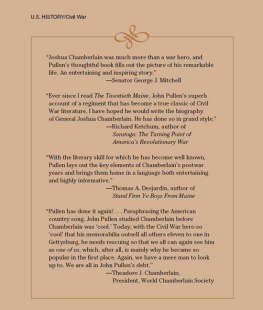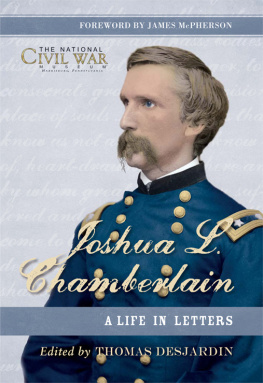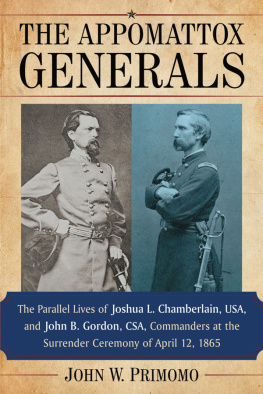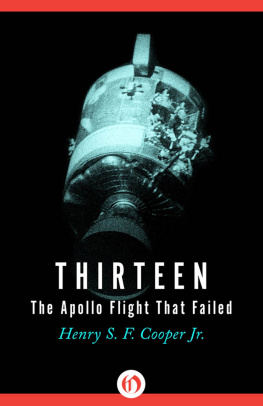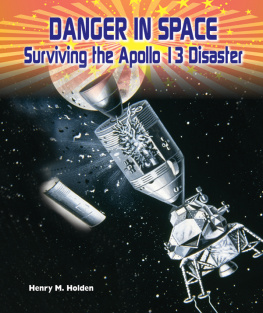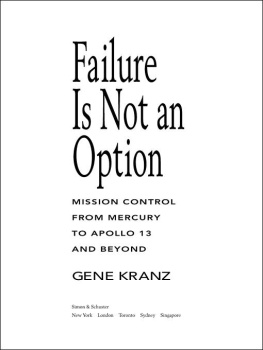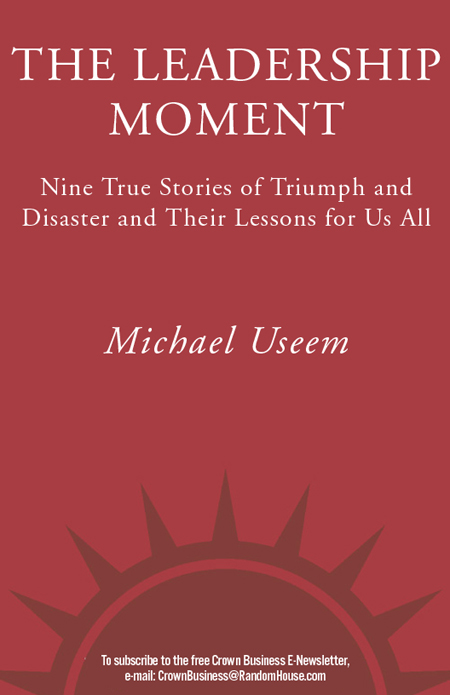THE
LEADERSHIP
MOMENT
Nine True Stories of Triumph and Disaster
and Their Lessons for Us All
MICHAEL USEEM

Contents
The Leadership Moment
Roy Vagelos Attacks River Blindness
The drug was needed only by people who could not afford it.
Wagner Dodge Retreats in Mann Gulch
What the hell is the boss doing, lighting another fire in front of us?
Eugene Kranz Returns Apollo 13 to Earth
What do you think weve got in the spacecraft thats good
Arlene Blum Ascends Annapurna
The expedition needed a strong leader but not a dictator.
Joshua Lawrence Chamberlain Defends Little Round Top
We know not the future, and cannot plan for it much. But we can... determine and know what manner of men we will be whenever and wherever the hour strikes.
Clifton Wharton Restructures TIAA-CREF
Heres a great institution that is in more trouble than it realizes.
John Gutfreund Loses Salomon Inc.
Its a harsh world, where mistakes are not charitably dealt with.
Nancy Barry Builds Womens World Banking
I feel that my whole life has been preparing me to do this job.
Alfredo Cristiani Ends El Salvadors Civil War
I looked at the country the way I looked at my business.
Vision plus Action
Ive been told that if you dont come I can shoot you. Well, you know I wont do that. Not Maine men....
Heres the situation. Ive been ordered to take you along, and thats what Im going to do. Under guard if necessary. But you can have your rifles if you want them. The whole Reb army is up the road a ways waiting for us and this is no time for an argument like this. I tell you this: We sure can use you. Were down below half strength and we need you, no doubt of that....
This Regiment was formed last fall, back in Maine.... Some of us volunteered to fight for the Union. Some came in mainly because we were bored at home and this looked like it might be fun. Some came because we were ashamed not to. Many of us came... because it was the right thing to do....
This is a different kind of army. If you look at history youll see men fight for pay, or women, or some other kind of loot. They fight for land, or because a king makes them, or just because they like killing. But were here for something new.... This hasnt happened much in the history of the world. Were an army going out to set other men free....
Here you can be something. Heres a place to build a home. It isnt the land theres always more land. Its the idea that we all have value, you and me, were worth something more than the dirt.... What were fighting for, in the end, is each other....
I think if we lose this fight the war will be over. So if you choose to come with us Ill be personally grateful.3
Chamberlains regiment, which had been speeding north-ward with the Army of the Potomac, crossed into Pennsylvania early on the afternoon of July 1. His mens apprehension grew as they heard cannons ahead and passed cavalry horses dead by the roadside. By early evening, still sixteen miles south of Gettysburg, Chamberlain and the Fifth Corps halted their march to prepare supper and make camp for the night. Little of either was ready, however, before a hard-riding Union messenger arrived with urgent instructions: two Federal corps had battled the rebels all day near Gettysburg, and the Fifth Corps was to advance immediately.
The men of the 20th resumed their northward tread through the countryside, wearied by the unrelenting pace of the past days but carried by anticipation of the coming battle. Colonel Strong Vincent, a Pennsylvania native and Chamberlains immediate superior, confided a premonition to another officer with whom he rode across the moonlit farmlands: What death more glorious could any man desire than to die on the soil of old Pennsylvania, fighting for the flag?
Chamberlains marching unit was halted after midnight, and his men were afforded a brief rest along the roadside. A bugle broke their slumber just three hours later, and the 20th Maine advanced the last several miles to Gettysburg with neither breakfast nor coffee, arriving by 7 A.M. behind the front lines just south of town. The Federals had formed a defensive position that came to be known as the fishhook, as shown in Figure 5.1. Troops and cannon were arrayed along Culps and Cemetery Hills, on the northern end of the hook, and on Cemetery Ridge, extending south. At the southern extremity stood a modest, partially bare hill, Little Round Top, that would become the eye of the fishhook later in the day. At the moment, though, it was undefended.
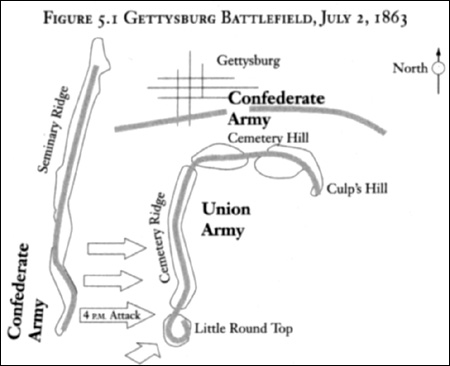
On July 2, George Meade opted to remain entrenched behind his defensive perimeter, but Robert E. Lee was ready for offense. He instructed Longstreet to assault the Union left, the southernmost extension of the fishhook, and by 4 P.M. Longstreets divisions were in motion against the Federals. Meade had been making continuous adjustments all day in the positions of the seven corps he had brought to the field. Now, with Longstreets massive late-afternoon attack finally becoming all too evident, Meade rushed his Fifth Corps forward in support of a Union front that was crumbling. As part of the advance, Colonel Strong Vincent took his brigade the 20th Maine and one regiment each from Michigan, New York, and Pennsylvania to a wheat field just west of Little Round Top.
About the same time Chamberlain arrived in the wheat field, a thirty-three-year-old brigadier general, Gouverneur K. Warren, mounted Little Round Top to inspect its potential. The armys chief topographical engineer with an excellent feel for strategic ground, Warren was startled to discover not only that Little Round Top was undefended but also that southern troops were massing in the trees just below. The discovery was intensely thrilling to my feelings, he later wrote, and almost appalling. A Confederate commander among those assigned to take Little Round Top and its larger sister hill, Big Round Top, just to the south, was equally thunderstruck by the military significance of the high terrain: if he could place just a few artillery pieces on Big Round Top and fell the trees that covered it, he would have a Gibraltar that I could hold against ten times the number of men that I had.
Warren dispatched an urgent request for a Union brigade to occupy Little Round Top, the most important of the two hills and the most imminently threatened. His staff officer, Lieutenant Ranald Mackenzie, managed to find General George Sykes on the battlefield. Sykes, elevated to Fifth Corps commander on June 28 in the wake of Meades promotion to the top, in turn dispatched Mackenzie to locate the commander of the Fifth Corps First Division, James Barnes; but Mackenzie, searching vainly for Barnes, chanced instead on Strong Vincent, whose brigade happened to report to Barnes.
What are your orders? demanded Vincent. Give me your orders! Reluctant at first, the aide finally confided that he was to instruct Barnes to rush a brigade to occupy that hill yonder. Without direct orders but emboldened by the exigencies, Vincent declared, I will take my brigade there. He rushed his brigade onto Little Round Top and assumed personal responsibility for the decision.


